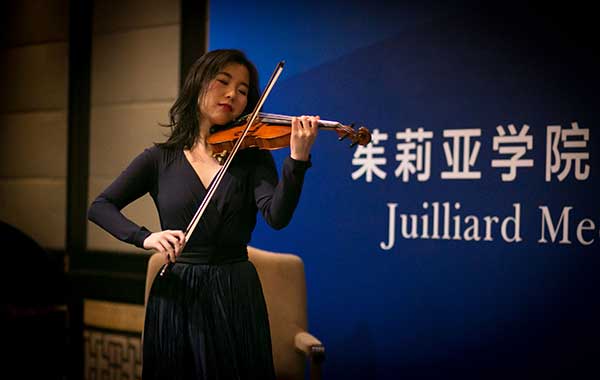 |
|
[Photo by Zhang Wei/China Daily] |
"The first thing we wanted to show to her was our dedication to excellence. We also showed her a bit of drama, dancing and music. She is a musician and a music educator. It was a magical and unique moment to have the first lady with us."
Founded in New York in 1905, Juilliard has trained some of the world's leading artists, including Van Cliburn, Renee Fleming and Yo-Yo Ma.
In 1984, Polisi wanted to change the school and give the musicians, actors and dancers a greater sense of responsibility."I want them to understand that their job is not just to perform onstage and disappear but to be advocates for the arts. That took a long time to achieve. Now 50 percent of our students go to places like hospitals and nursing homes on a weekly basis to teach and perform," he says.
Since the 1920s, the Juilliard has enrolled students from China. Today, there are nearly 300 pre-college and college alumni from China, and more than 80 Chinese students are enrolled in Juilliard college and pre-college programs in New York.
In 2008, the Juilliard Orchestra toured China. The Juilliard String Quartet followed suit in 2015.
"One of the most important things I learned from the Juilliard is that, first and foremost, throughout your experience in music, you have to have a sense of joy in what you are doing. If you are so worried about getting the notes right, you'll never talk and express your feelings," says violinist Song Xinyu, who started learning violin aged 4 and went to study at its pre-college program in New York at 10.
After graduating with a master's degree from the Juilliard in 2013, she returned to China two years ago and now teaches violin at Soochow University in Jiangsu province.
Polisi, who is also a bassoonist, explains the move is also an acknowledgment of the growing market for classical music in China.
"There are millions of children studying music in China. Chinese artists are successful and regular performers in all the great concert halls of the world," he says.
For the general public, the Juilliard will launch a project in its Tianjin branch, called Juilliard Imagination, which is a performance and audience-engagement space, comprising three performance venues and an interactive exhibition area, where an annual season of performing arts and educational activities are held.
"We hope that the school will not be just a place for people to study music but also a destination for people to visit for performing arts, like dances and dramas," Polisi says.
To capitalize on the impact of technology, Juilliard also released two apps for iPhone and iPad internationally in May in English, and in simplified and traditional Chinese.
"The Juilliard's move in China will benefit China's music learners and lovers. It will also promote music education in China," says Xu Changjun, president of the Tianjin Conservatory of Music.
"It is not in conflict with China's music education but is a good complement."